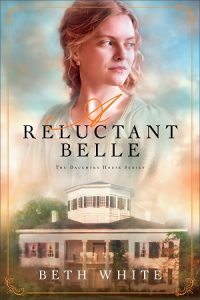A native Mississippian, Beth White writes historical romance with a Southern drawl. In A Reluctant Belle (Revell), the second title in her Daughtry House trilogy, she weaves a captivating tale of a love triangle entangled in the turbulence, dangers, and intrigues of America’s post–Civil War. Could a Southern belle’s dangerous secret be a catalyst for change? In this interview, Beth talks about the book’s post-Civil War setting, outlines the journey of her strong female lead, and reveals some of the pitfalls of writing “honesty covered by grace”…
Beth, you selected post–Civil War as the time period for your book. Why did you choose to write about this time in history?
 The Civil War upended society on every level, and in its aftermath came a turbulent time when Americans determined how our government would proceed in the coming decades. I found the interplay of sectional politics, race relations, and gender dynamics a fascinating snarl to unravel.
The Civil War upended society on every level, and in its aftermath came a turbulent time when Americans determined how our government would proceed in the coming decades. I found the interplay of sectional politics, race relations, and gender dynamics a fascinating snarl to unravel.
Technological developments of the period affected people’s choice of career and sent them adventuring across the continent. Religious and spiritual beliefs came into question, forcing men and women to reconsider moral questions supposedly settled for centuries. The rise of violent organizations such as the Ku Klux Klan cast the average men and women who opposed them in the role of heroes.
So many great stories to tell!
The three sisters in your series play strong female roles. Can you tell us about your main female character in A Reluctant Belle?
Joelle is an introverted bookworm with a longing to break out of her shell—a concept with which I am all too familiar. Self-consciousness and fear can paralyze anyone, and only faith in God and obedience to his Word breaks us out of that prison. I wanted to show Joelle slowly spreading her wings, coming to believe God loves her as she is and has a plan for her, and finding her place in the family business.
As the story begins, she has no idea how much she loves Schuyler already and how perfect he is for her—mainly because she is so uncomfortable in her own skin. His pursuit of Joelle is somewhat of a metaphor for God’s pursuit of his bride, the church.
You deal with some sensitive times in American history. How were you able to accurately and delicately handle these issues?
You know, I think the sensitive issues are still with us in a lot of ways. And it’s still difficult. People are afraid of the different. People put others in boxes with labels. People attack when they’re defensive about their own flaws.
When I’m writing a story about these kinds of things, I try to imagine myself in the other person’s shoes and write with honesty covered by grace. I make lots of mistakes that my editors and beta readers point out, and I fix them as best I can. You might wonder how an author can take on the point of view of another race who has been discriminated against and mistreated—but that’s what all fiction is.
What would you like readers to learn from A Reluctant Belle?
I don’t really approach a story that way. I think about what I want to learn. I juxtapose as many different viewpoints related to the story question as I can, throw them all into conflict, and then work them out again as naturally as possible.
In this case, the general theme seems to be Can people who have every reason to hate one another learn to forgive and live together in peace and mutual respect? I believe the answer is yes!
But it takes extraordinary humility, strong faith in God, and willingness to operate from a vulnerable spirit. Also, a sense of humor doesn’t hurt!
Why do you prefer the historical romance genre?
There are a lot of things I love about reading and writing historical romance. As a reader, I’m always learning something from history that impacts my twenty-first-century life.
And I’ve always enjoyed stories that contain at least one plot thread that asks the question Will the boy get the girl? Ha! I think most women are wired to be matchmakers, if not for themselves, then for the people they love.
Maybe that’s something God built into us, to encourage marriage and family, his plan for nurturing human beings. I don’t see how any author can write what she doesn’t enjoy as a reader. There’s just something soul-satisfying to me about creating characters, a male and a female, who discover that they complete one another by the end of the book.
There’s a special challenge in placing that discovery in a historical context, where social mores are specifically set. Where events in a specific time dictate food, clothing, setting, technology, language. Where I have to research every last detail and get it right!
Visit Beth White’s author page:
https://www.familyfiction.com/authors/beth-white

A Reluctant Belle
Daughtry House #2
Beth White
Revell
Buy the book from our store!


